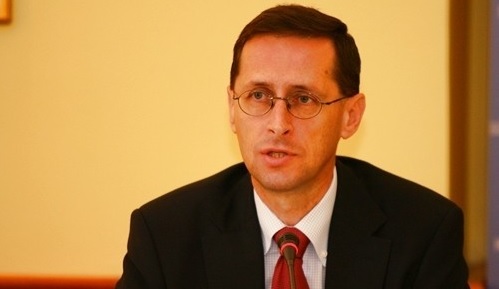By Zoltán Kovács.
Article originally published on About Hungary, the blog of the International Communications Office of the Cabinet Office of the Prime Minister of Hungary.
Hungary – It was a no-holds barred, nearly three-hour-long, press conference with more than one hundred journalists from the domestic and foreign press corps – and yes, among those present were the biggest, most critical media outlets.
The prime minister addressed a wide range of topics: Fidesz and the future of the EPP, Hungary’s relations with Russia and Turkey and our pragmatic foreign policy, his opinion of Europe’s Greens (they’re “watermelons; green on the outside, red on the inside”) and why they’re gaining ground, his optimism about the UK’s prospects post-Brexit, the lessons learned in Hungary’s local elections in October, his views on the media balance in Hungary and, yes, the “talented Hungarian,” George Soros and why Commissioner Timmermans needs to get a grip on reality.
“Over the next two years, we want to build on our achievements,” PM Orbán said, defining the coming era. The PM gave a brief account of the current situation in Iraq and Hungarian soldiers stationed there, the latest on illegal migration, economic growth, health care reforms and climate policy. The prime minister then engaged in a two-hour Q&A session with the international press corps.
“Among the recent rocket attacks,” PM Orbán began on the topic of Hungarian troops in Iraq, “there were bases that were attacked where there are Hungarian soldiers stationed,” he said, “but not a single Hungarian soldier was hurt,” adding that Hungarian soldiers are “as safe in Iraq as soldiers in Iraq can be.” However, the PM clarified that if necessary, Hungary has all preparations in place to perform an immediate evacuation.
Addressing Hungary’s goals for Friday’s meeting of EU foreign ministers in Brussels, Prime Minister Orbán said that the government hopes to achieve a common EU position on Iran with respect to the United States’ policy direction.
“In 2019, 450 thousand crossed the border illegally into Turkey,” marking a steep, 70 percent increase compared to the previous year, PM Orbán said, evaluating the latest Turkish reports on the growing migration pressure. As a result, the number of migrants arriving to Greece nearly doubled, and daily arrests at the Hungarian border now exceed one hundred.
“This is why,” the prime minister said, “we must increase the number of soldiers and police working on the Serbian-Hungarian border.” Meanwhile, a V4 border protection agreement has also entered into force, and Hungary expanded police cooperation with North Macedonia and Serbia in order to repel and capture illegal entrants.
Touching upon the state of Hungary’s economy, Prime Minister Orbán pointed to the results of what a growing number are referring to as “Orbanomics”: For the first time in 30 years, we now have over 4.5 million people employed. This means, in comparative terms, that there are more than 800 thousand more Hungarians at work today than in 2010. While average wages have grown a staggering 80 percent over the last decade, salaries of the lowest-earning social groups have also increased dramatically. Since 2010, minimum wages and salaries for skilled laborers are up 120 and 135 percent respectively.
“The question is,” Viktor Orbán asked, “how the Hungarian economic model can function if there is no economic growth in the Eurozone?” For this reason, “the year 2020 will be an unusual, special and exciting year.”
In an attempt to keep our healthcare workers at home, Prime Minister Viktor Orbán said that the government will enact a 72 percent wage increase in the sector over the next two to three years. At the same time, the PM added, he asked the development minister to make hospital renovations a top priority. “I think it’s fair that people are saying that those places where they go are not in proper condition,” PM Orbán said. He further confirmed that, according to a recent government decision, all hospital facilities that are more than three years old will be renovated.
Commenting on climate policy, PM Orbán said that the government has just adopted its national energy and climate strategies. These two, according to the premier, need to be taken care of jointly. “Out of 200 countries in the world, only 21 countries were able to see GDP growth at the same time that their carbon emissions declined,” PM Orbán said. Hungary is, in fact, among those 21 countries.
While Hungary, one of the “climate champions,” has already passed such countries as Germany, the Netherlands and Austria, the government aims to achieve energy production that is 90 percent carbon-free by 2030.
In summary, Prime Minister Orbán concluded that Hungary’s modern history has always been characterized by periods of national decline and building. The next elections will be held in 2022, the PM said, and until then the government will focus all of its efforts on build on the country’s success.
Here are some highlights from the Q&A:
On Soros and the criticism that the government of Hungary makes too much of the topic, the prime minister said that detractors like Commissioner Timmermans need to come to terms with reality.
“We don’t have a Soros phobia,” he said, “We are not fixated. But we confront a very strong group that is directed by George Soros,” and their goal is to influence the politics of the EU.
“I consider, George Soros a talented, Hungarian man. That’s exactly the problem. I’m very sorry that he is not with us but against us.”
Responding to a question from German public television ZDF as to whether Fidesz will leave the European People’s Party, the prime minister said that as the “EPP is getting more and more liberal, socialist and centrist,” we aren’t preserving our original values. Ideally, Fidesz’s goal would be to change the EPP. The future EPP, according to PM Orbán, should be different – the question is whether Fidesz has any power in the EPP to initiate such changes. “If we can’t achieve change in the EPP, we will initiate a new movement in the EP,” he said.
In response to a question about Hungary’s relations with countries that are not democracies, the prime minister said that pursuing a foreign policy that is based solely on values limits our ability to find compromise. There are three options in foreign policy, he said: isolation, compromise or war. The best option among those is compromise.
Meanwhile, the Financial Times inquired about PM Orbán’s future policy towards the United Kingdom, after Brexit. “We need to cooperate with the United Kingdom on good terms and on a strategic level,” PM Orbán said, naming Boris Johnson one of today’s “bravest European politicians.” According to the PM, there is certainly a “success story brewing” in the UK, while the European Union is wrong to think that a proper relationship is primarily in the UK’s interest.
In reply to a question about media freedom and what kind of balance exists on Hungary’s media landscape, the PM said experience speaks volumes here. Based on experience, he said, if they were to hold a secret vote among the journalists in the room, he would lose by a proportion of 80-20 because the vast majority of journalists do not sympathize with the government. And that’s true everywhere in the western world.




